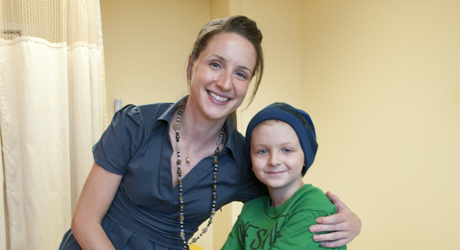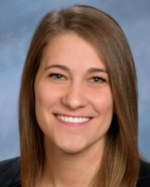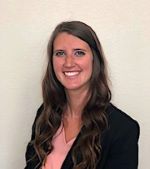Pediatric Hematology/Oncology Fellowship Program
The Pediatric Hematology/Oncology Fellowship Program in the Division of Pediatric Hematology/Oncology is aimed at the trainee whose goal is a career in academic medicine.
Fellows receive training in an accredited program focused on developing medical knowledge, clinical skills and judgment, self-assessment, proficiency in communication, professional attitudes and behavior, competence performing medical procedures, research skills, teaching proficiency, humanistic qualities, and a commitment to scholarship. Applicants must have completed an ACGME accredited residency program by the fellowship start date.
Prospective Fellows
We appreciate your interest in the University of Minnesota's Pediatric Hematology/Oncology Fellowship Program and look forward to reviewing your application. Our program participates in the National Resident Match Program (NRMP) and will accept applications only through the Electronic Residency Application Service (ERAS). Please contact the Program Director, Dr. Alexander Boucher (bouch070@umn.edu), if you have any questions not answered here on the webpage.
Please Note:
- Applicants must have completed at least two years of Pediatric training (preferably 3 years).
- Applicants must have completed an ACGME accredited residency program by the fellowship start date.
- We accept only applicants who are U.S. citizens or permanent residents (green card holders), or those who have a J-1 Visa.
Information to be directed to ERAS:
- Personal statement
- Letter of intent & curriculum vitae (include your background, education and experience, long-term goals, and areas of interest)
- 3 letters of recommendation (one of which should be from the director of your residency program).
- Medical school transcript
- USMLE Board Scores or COMLEX Scores
- ECFMG Certificate (if applicable)
The University of Minnesota demonstrates a commitment to leveraging the transformative power of equity and diversity to advance excellence in teaching, learning and community engagement. Applications from individuals who self-identify as members of underrepresented groups are particularly welcome. Applicants with exceptional circumstances who are seeking positions outside of the match should contact the Program Director at the earliest possible date.
Stipend & Benefits
This page provides access to information on stipends and benefits for medical residents & fellows.
Additionally, each medical fellow receives:
- Funding of the ABP General Pediatrics Certifying Exam
- At least $1,500 for professional development
- At least $300 annually in education funds
- MN medical license, or MN residency permit if ineligible for a MN license
- AAP membership with subspecialty section membership
Clinical Experience

During the three-year training program, time is distributed to ensure that fellows develop both clinical and research expertise. The program provides approximately 12 months in the first year and 1-2 months in the 2nd and 3rd yr exclusively for clinical work, complimented by 20 months of protected time for hypothesis-driven research during years 2 and 3.
Year 1 of the fellowship is designed to develop clinical skills through direct inpatient and outpatient care. In addition, fellows supervise and teach pediatric residents and medical students in the care of hospitalized pediatric hematology/oncology and blood and marrow transplant patients. During the first year, fellows will be assigned as the primary physician of 10-20 newly diagnosed patients whom they will follow for the three years of the fellowship.
In addition, trainees provide consultations to the emergency department and other pediatric and surgical specialties, thereby gaining familiarity with the hematologic and oncologic manifestations of a broad spectrum of pediatric illnesses. First-year fellows will complete rotations in Hematopathology, Blood Banking, Neuro-Oncology, Radiation Oncology and Coagulation.
The University of Minnesota Divisions of Pediatric Hematology/Oncology and Blood and Marrow Transplantation have several clinical programs from which our fellows gain experience. The Blood and Marrow Transplantation, Fanconi Anemia and Leukemia Programs each offer unique opportunities for our fellows to gain expertise in these areas.
Research Training
Years 2-3 of the fellowship are devoted primarily to hypothesis-driven research projects. The program offers two distinct research tracks, focusing on either (1) laboratory research or (2) clinical research. Fellows interested in academic careers in clinical research may obtain a Master’s Degree including, but not limited to, a Master’s of Science in Clinical Research (MSCR) from the University of Minnesota. Based on the fellow’s long-term academic career objectives and interests, selection of the research track and specific research projects are made by the fellow in conjunction with their faculty advisors and future research mentors, prior to the end of the first year of fellowship.
During the 2nd year of fellowship, fellows will take part in a weekly half-day hematology continuity clinic to further develop their training and expertise in classical hematology with outpatient management of hemoglobinopathies, bleeding/clotting disorders and general hematology. Fellows will have the opportunity to continue this weekly clinic during their 3rd year of training if they so choose. Our fellows have a history of incredibly productive and robust research experiences. We support our fellows in all facets of research, whether it be basic science, translational, clinical, epidemiological, or quality improvement. Here are some great examples of recent publications our fellows have had the opportunity to publish.
Although fellows are not required to secure funding during their fellowship, we do have unique opportunities for funding including the Children’s Cancer Research Fund (CCRF) Emerging Scientist Award (recent recipients: Robert Galvin, MD and Taumoha Ghosh, MD), as well as the Nesbit Travel Award which provides funding for a fellow to travel to an international pediatric hematology/oncology conference of their choosing.
Year 4 - Under specific circumstances, the option of a fourth year of fellowship is possible. In those situations where a fourth year is approved, the full effort of the fellow is devoted to research.
Education & Scientific Committees
Fellows participate in a wide range of conferences throughout their training. The weekly fellow’s conference covers the general topics in the fields of pediatric hematology, oncology, and stem cell transplantation. In addition, a series of core lectures are presented to the fellows early in their first year of training, covering acute and emergent problems in hematology, oncology, and stem cell transplant along with how to give a “New Diagnosis” talk to the patient and their families.
Throughout the three-year training program, fellows participate in weekly Tumor Conferences which include presentations of new cases, discussions of plans for patient management and follow up, and reviews of the literature. They also take part in a twice monthly Hematopathology Conference where peripheral smears, bone marrow aspirates/biopsies and flow cytometry are reviewed on both malignant and classical hematology patients. Other weekly conferences include Neuro-Oncology Conference, Bone and Soft Tissue Sarcoma Conference, Bone Marrow Transplant Research Conference, Hematology/Oncology Journal Club (monthly), Pediatric Morbidity & Mortality Conference and the Department of Pediatrics Grand Rounds. Fellows may also attend ongoing seminar series through the Masonic Cancer Center, University of Minnesota.
All fellows complete a core departmental fellowship curriculum that includes statistical analysis and study design, bioethics, and the development of skills in scientific writing and presentation.
Fellows are encouraged to attend one scientific meeting each year with funding provided. Funding for travel to additional meetings may be available for fellows who are invited to present their research.
In summary, fellows who complete their training at the University of Minnesota in Pediatric Hematology/Oncology will attain a high level of competence in both the clinical and research aspects of the field. They will not only have developed a strong foundation in the management of the common Hematologic and Oncologic diagnoses but will have gained particular proficiency in Hematopathology/ Flow Cytometry along with Blood and Marrow Transplantation, where the University of Minnesota is a world leader in the field.
As evidence of the success and productivity of our fellows, follow this link for a collection of recent paper publications, poster abstracts and oral presentations and both internal/external grant funding that our fellows have received.

Anne Boldt
bolt085@umn.edu
Fellowship Dates: 2024-2027

Dan Ly
lyxxx108@umn.edu
Fellowship Dates: 2024-2027

Michelle Grafelman
grafe010@umn.edu
Fellowship Dates: 2023-2026
Fellows in Focus - Meet Michelle

Shelby Mestnik
mestn005@umn.edu
Fellowship Dates: 2022-2025
Fellows in Focus - Meet Shelby
Contact Us
Fellowship Program Director
Alexander Boucher, MD
Associate Professor
bouch070@umn.edu
Placeholder
Fellowship Coordinator
Sidney Clarke
clar2258@umn.edu
(612) 624-0946
For more information on our other medical fellowship programs, click here.